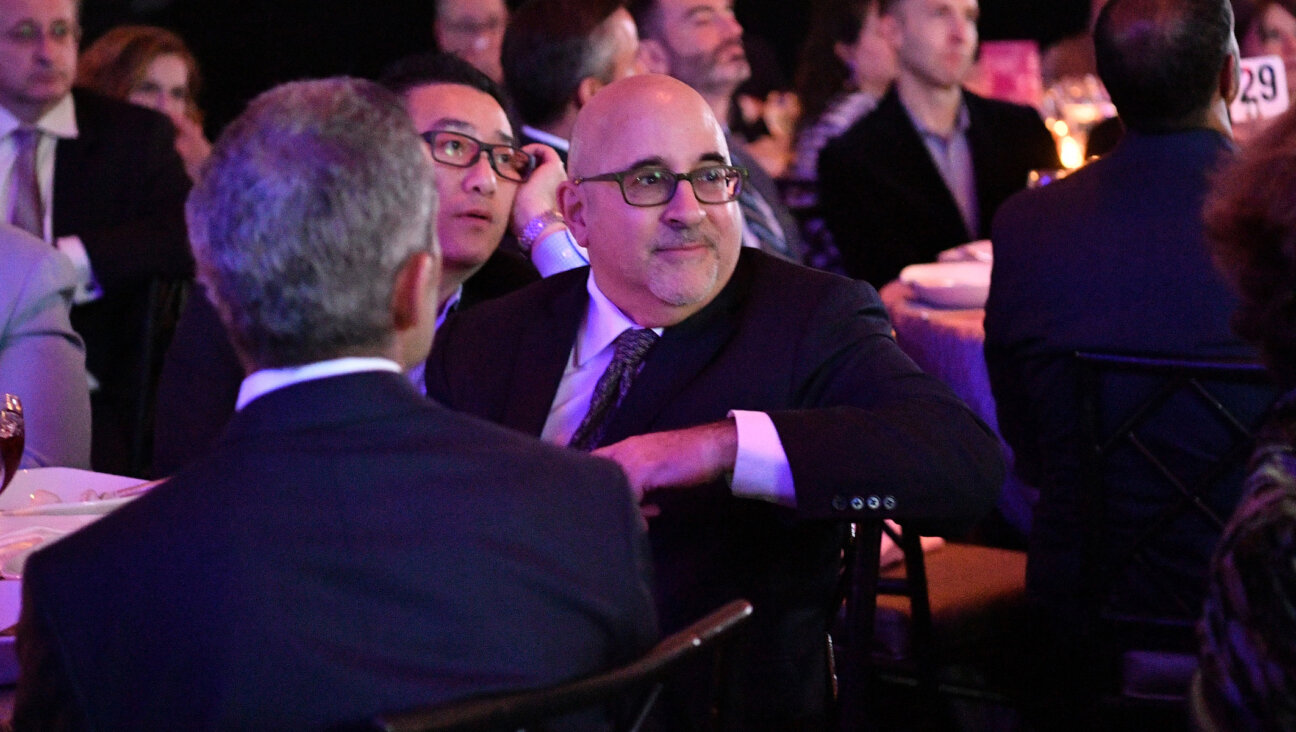Super Tuesday Snapshots: Obama’s Jewish Neighbors, Peace at the Caucuses, The FDR Vote, Satmar Feud, Tehrangeles’s Jewish Vote, Etc.
Chicago, Illinois
Obama’s Jewish Neighbors
Barack Obama may have a deadlock on at least one segment of the Jewish community: his neighbors. KAM Isaiah Israel, the oldest synagogue in Chicago, is directly across the street from Obama’s house.
Members of KAM, a large Reform synagogue, report having seen the Illinois senator engaged in mundane activities around their Hyde Park neighborhood, like buying toothbrushes at Walgreens with his daughters.
But Obama’s Secret Service agents spend more time at the synagogue than Obama himself — especially when they need to use the bathroom.
“They came in to introduce themselves and to apologize in advance for any disruption that their presence might have,” said Sandy Lieberman, KAM’s executive director. Lieberman, in turn, offered to let them use the synagogue’s restrooms.
The bathroom-sharing deal led to unexpected hi-jinks: At the outset of Obama’s presidential campaign, Secret Service agents would sometimes attempt to use KAM’s bathrooms at night, only to trip the synagogue’s alarm.
“But they’ve gotten the knack of it,” Lieberman said. She added that the agents have been “extremely nice,” even doing programs with the synagogue’s nursery school students.
According to Grace Wolf, a Hyde Park resident who is married to the rabbi emeritus of KAM, Obama is backed by a solid swath of the congregation’s members.
“We had been to his fundraisers and met him” when he was an Illinois state senator, said Wolf, who supported Obama in the Illinois primary. “When I would see him at our local supermarket, I would go up to him and say, ‘Hi Senator Obama, I’m Grace Wolf,’ and he would say, ‘How’s the rabbi?’”
And he didn’t even need to use the bathroom.
— Marissa Brostoff
Kansas City, Kansas
Peace at the Caucuses
One voter in Kansas City, Kan., arrived at his state’s caucuses hoping to do more than support his candidate.
Allan Abrams, chair of the Kansas City chapter of Brit Tzedek v’Shalom, a left-leaning Jewish advocacy group, arrived at his Kansas caucus prepared to present a resolution calling for the United States “to actively and persistently engage in the resolution of the Israeli-Palestinian conflict.”
“The objective would be to get the Democratic Party to ratify this resolution” at the Democratic National Convention in August, Abrams said.
Abrams planned to put the resolution to caucus-goers, who would have a chance to vote on it along with other measures. In the end, however, voter turnout was so high that he never got a chance to make his pitch.
“It’s incredible how many Democrats are here,” Abrams reported while on a break from the caucus. “This is one of the most Republican counties in one of the most Republican states.”
The crowd was so large that it spilled out of the church where the caucus was being held and into the synagogue that Abrams attends, across the street.
In order to take the Brit Tzedek resolution to the next level of the Kansas Democratic Party, Abrams, an Obama supporter, sought to be elected by fellow caucus-goers as a precinct delegate. He won a spot, beating out an 18-year-old and a 19-year-old vying for his position.
The delegates who were chosen at the Kansas City caucus will reconvene in April to discuss measures and resolutions and to determine who will attend the Democratic National Convention in August.
The idea to bring a Brit Tzedek resolution to the caucus was inspired by a strategy that another member of the organization used in Seattle during the primary elections of 2004. That year, Rainer Waldman Adkins, chair of the Greater Seattle chapter of the organization, presented a similar resolution at his precinct caucus. Caucus-goers approved it, and the resolution was ultimately inserted into the Washington Democratic Party platform.
A state party platform is “frankly symbolic, because in many cases the politicians just ignore it,” Adkins said. “But it’s very symbolically important. People can choose to use it as ammunition against the party, or can use it to demonstrate how wonderful the party is.”
Waldman thought that at least 10 Brit Tzedek members in caucus states planned to present this year’s resolution at their caucus.
— Marissa Brostoff
Phoenix, Arizona
Paper Backs Obama
In Arizona, home state of Republican Senator John McCain, the local Jewish newspaper is urging its readership to back Barack Obama. Jewish News of Greater Phoenix, an independent family-owned newspaper founded in 1948, published an editorial February 1 endorsing the senator from Illinois.
“He has been a good friend to and strong advocate of the Jewish people and a stalwart supporter of Israel since his earliest days in the Illinois Legislature,” the editorial said. Still, it threw a bone to its hometown boy, saying that of the Republican field, McCain was “far and away the most attractive option.”
While it regularly endorses candidates in local elections, the weekly broadsheet, which has a circulation of 7,000, does not routinely take sides in presidential primaries. This year, said Tim Eckstein, a contributing editor who penned the editorial, it offered up a primary endorsement in large part because Arizona’s primary has far more gravity than in years past.
“This is the first year that Arizona has had a primary when the election wasn’t already decided,” Eckstein said. That, coupled with the fierce competition of this year’s race, inspired the editorial, he said. Eckstein, 38, is the son of the paper’s editor and publisher, Florence Eckstein.
Phoenix, with an active Jewish population of some 83,000, is the 19th largest American Jewish community, according to the 2006 American Jewish Year Book.
— Rebecca Spence
Brooklyn, New York
The FDR Vote
If members of the baby boom generation invoke John F. Kennedy when it comes time to hand out political compliments, an older generation of Jewish New Yorkers still reaches for the measuring stick of an older, homegrown political giant: Franklin Delano Roosevelt.
On Super Tuesday, an informal poll of residents of the Amalgamated Warbasse Houses in Brooklyn’s Brighton Beach section found the overwhelming majority backing Hillary Clinton, with the dissenters as likely to invoke Roosevelt or Harry Truman as JFK when attempting to pin down the appeal of Clinton’s opponent, Illinois Senator Barack Obama.
“Historical times calls for certain leaders, like the Depression or the Second World War called for a man of FDR’s abilities,” said Jacob Axelrod, 72, a lifelong Brooklynite who has lived in the Warbasse houses since opening day in 1965. “We’re in a recession, and the war in Iraq has to be ended. The times now call for someone like Obama.”
If Axelrod takes the long view, he has plenty of company from his neighbors at Warbasse. The complex is one of several middle-income housing developments built in New York after World War II, through the cooperation of unions, civic groups and the government. Thousands of the city’s Jews bought apartments at low prices, raised their children in the development and have stayed on into old age. In this, the complex has stayed true to its namesake, public-health advocate James P. Warbasse, who nearly a century ago wrote that “health and life are too precious to be at the mercy of trade and barter.”
— Jennifer Siegel
Satmar Feud
The split between the two heirs to the Satmar Hasidic dynasty spilled over into the political arena this week.
According to Yiddish-language listservs and blogs hosted in Israel, there was a an Internet campaign underway to urge Satmar residents in the Williamsburg section of Brooklyn to vote for Hillary Clinton, while at the same time urging residents to physically cross off her delegate, Rabbi David Niederman, from their ballots. Allies of Niederman countered, urging voters to support him.
Niederman is considered to be a follower of Zalman Teitelbaum, who splits the community’s allegiance with his brother, Aaron Teitelbaum.
Throughout the listserv posts, calls were made for visitors to promptly urge their spouses and children to vote, but to abstain from supporting Niederman. Few, if any, cogent arguments are provided and impenetrable financial statistics related to his community-organizing work abound.
After the 1999 split between the brothers, different community organizations became affiliated with feuding rabbinical leaderships. He is currently the director of the United Jewish Communities of Williamsburg, an umbrella organization that serves as a provider of social and housing services, as well as public health and community development services in the Williamsburg area.
“I don’t read the blogs and I am not aware that they exist.” Niederman remarked, when reached by the Forward. “Voting is going on in Williamsburg right now.
— Eli Rosenblatt
Lakewood, New Jersey
Primaries Get Little Notice
Even as voters across the country cast their ballots in one of the most intensely contested primaries in recent memory, Lakewood, N.J., was quiet Tuesday. This former resort town in southern New Jersey is home to Beis Medrash Govoha, one of the largest yeshivas in the world and a potent force in New Jersey politics, capable of swinging 10,000 votes.
But in the wake of Rudy Giuliani’s withdrawal from the race and the decision by an influential yeshiva not to endorse any candidate, only a trickle of ultra-Orthodox Jews came to vote at the Municipal Building in downtown Lakewood, even as neighboring Clifton Street bustled with shoppers.
“There’s no place else in the state with a voting bloc like that,” said Elnatan Rudolph, a council member in Teaneck, N.J. “They vote for whoever the Rosh Yeshiva [school’s dean] tells them to.”
But in this primary, as is often the case in national primaries, the head of Beis Medrash Govoha made no endorsement, depressing the Orthodox turnout. “This will be a very quiet election,” Deputy Mayor Meir Lichtenstein said early Tuesday.
Of the Orthodox voters who did make it to the polls, several said that their first choice would have been Giuliani.
“He cleaned up New York in ways that I had not thought were possible,” said a woman who declined to give her name. She said she was voting for John McCain, because “I feel he gave a lot to the country.”
Orthodox voters who spoke to the Forward were roughly split between McCain and Mitt Romney. Fred Weiss said that McCain got his vote because he was “very tough on terror and the economy,” while a local shop owner who asked to be identified as Frank G. said he was voting for Romney because “[h]is financial, private sector successes tell me he can get the job done better.”
Hillary Clinton and Barack Obama drew few words of praise.
Many potential voters, however, remained aloof from the election. Rochelle and Yosel Leffler, a retired couple, chose to read the newspaper in a bagel shop rather than vote for any of the candidates.
“There isn’t a candidate that I think is capable or has enough integrity,” Rochelle Leffler said before returning to the paper.
— Anthony Weiss
Los Angeles, California
Political Intermarriage
A prominent supporter of Hillary Clinton and an equally weighty backer of Barack Obama count themselves as members of the same swanky Beverly Hills synagogue — and the same family.
Toni and Bruce Corwin, both past presidents of Temple Emanuel, are partners in a Clinton-Obama “intermarriage.” The pair hasn’t voted differently since 1968, when Toni voted for Bobby Kennedy in the California primary, and Bruce registered Republican that year so as to cast his vote against Senate candidate Max Rafferty.
In the 2008 primary, Toni, 65, is throwing her weight behind Clinton, while Bruce, 67, is siding with Obama. But the couple, married 40 years, says it hasn’t strained their marriage.
“We tease more than we argue,” Toni said. “It’s my girl and his guy.”
Bruce, CEO of his family-owned chain of independent movie houses, Metropolitan Theatres Corp., was first introduced to Obama two and half years ago, prior to his Illinois Senate run, at a small breakfast for local Democratic Party leaders.
“I called Toni and said, ‘I just heard a future president of the United States,’ never dreaming it would happen this quickly.”
But when Bruce, who currently chairs the board of Temple Emanuel, heard Clinton speak just two months ago at an intimate campaign event in a West L.A. home, he switched camps.
“I’m a flip-flopper on this one,” he said, describing Clinton as “extraordinary and very competent.”
The Corwins have long supported the Clintons, dating back to Bill Clinton’s first presidential run in 1992. They attended the inauguration, and later supported Hillary Clinton’s bid to become a Senator from New York. Both Corwins, in fact, are maxed out on primary campaign contributions for Clinton.
And yet, said Bruce, when he ran into Obama in the lobby of the Beverly Wilshire Hotel a month later, he was once again mesmerized by the young politician’s magnetism.
“I ran out and shook his hand, and we were talking in the lobby. I said to myself, ‘deep down, this is the guy I want,” he said.
Despite Toni’s unflagging support for Clinton, she was not, she says, upset by her husband’s ultimate choice.
“Everybody’s got to do what they’ve got to do,” she said. “I didn’t try and convince him.”
— Rebecca Spence
Tehrangeles’s Jewish Vote
While most American Jews tend to vote liberal and Democratic, many Iranian American Jews have a decidedly different political preference, according to Iranian Jewish leaders in Los Angeles. In L.A., home to 30,000 Iranian Jews — with the largest chunk of them residing in Beverly Hills, presided over by Iranian Jewish Mayor Jimmy Jamshid Delshad — Republicans and conservatives tend to be the favored candidates.
“The section of the community that cares more about the Middle East definitely tends to vote for the Republicans,” said George Haroonian, a former president of the Council of Iranian American Jewish Organizations. “McCain seems to be the strongest, because of his armed forces and foreign policy expertise.”
Stopped by a reporter outside Beth Jacob Congregation, which, on Super Tuesday, doubled as a polling station, Albert Elihu, the CEO of a kitchen and bath company, said that he voted for Mitt Romney. Why? Because, Elihu, 51, said, Romney “is much more conservative than McCain.” “With economic and security issues,” he added, “I’m very hardcore to the far right.”
Still, according to Pooya Dayanim, president of the Iranian Jewish Public Affairs Committee, his community members simply look for the candidates who will take the strongest stance on Iran. And that can, of course, include Democratic candidates.
“The trend has to be toward McCain and Hillary,” said Dayanim, a Clinton supporter, “because they think Hillary and McCain will be tough on Iran.”
— Rebecca Spence
Atlanta, Georgia
Home Depot Founders Split
Arthur Blank and Bernie Marcus have been through a lot together — the two of them were fired from the same hardware store chain on the same day; they then founded the Home Depot chain of hardware mega-stores, building it into a multi-billion dollar business; and they are now both prominent Jewish philanthropists in their adopted city of Atlanta.
But the two have parted ways in the presidential race.
According to filings with the Federal Election Commission, Blank has donated the maximum of $4,600 to both Barack Obama and Hillary Clinton, as well as $2,100 to Mitt Romney. Marcus, meanwhile, has conserved his cash, making one $2,300 donation to the now-defeated Rudy Giuliani.
The political divergence of the two is nothing new — Blank has historically donated heavily to Democrats, though he has also supported a few Republicans, including Georgia’s incumbent Republican Senators. He also donated to Senator Joseph Lieberman, both before and after Lieberman split with the Democratic Party in his 2006 Senate race.
Marcus, meanwhile, has been a steady supporter of Republicans, though he disburses far less cash than Blank. His donations have supported several prominent Jewish Republicans, including Senators Arlen Specter and Norm Coleman, and Rep. Eric Cantor, as well as hawkish Democrat Rep. Tom Lantos.
Marcus and Blank did team up in 2006 to back local Democrat Hank Johnson in his successful congressional race against controversial incumbent Rep. Cynthia McKinney.
— Anthony Weiss
A message from our Publisher & CEO Rachel Fishman Feddersen

I hope you appreciated this article. Before you go, I’d like to ask you to please support the Forward’s award-winning, nonprofit journalism so that we can be prepared for whatever news 2025 brings.
At a time when other newsrooms are closing or cutting back, the Forward has removed its paywall and invested additional resources to report on the ground from Israel and around the U.S. on the impact of the war, rising antisemitism and polarized discourse.
Readers like you make it all possible. Support our work by becoming a Forward Member and connect with our journalism and your community.
— Rachel Fishman Feddersen, Publisher and CEO























